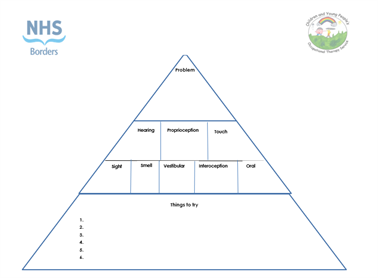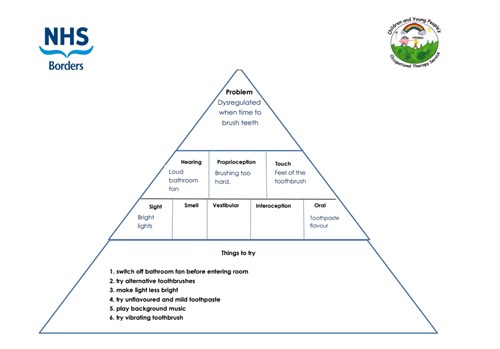Sensory Integration and Activities of Daily Living

An activity of daily living – also known as an ADL – is a primary occupation an individual needs to perform every day. Both children and adults need to engage in ADLs in order to function within their environment. These tasks can be very complex for children to learn. It is important to understand how their skill level and sensory integration differences may be effecting their independence and participation in such tasks.
These videos will provide you with specific sensory advice and strategies relating to your child's activities of daily living. Transcripts for each video are available to download:
|
Bathing, Showering and Hair Washing
|
Transcript |
|
|
Transcript |
|
|
|
|
|
Transcript |
|
|
Transcript |
|
|
Transcript |
|
|
Transcript |
|
|
Transcript |
Pyramid Problem Solving Tool
Once you have watched the videos you can use our pyramid problem solving tool that you can download below. This problem solving tool, helps us to think about the behaviour and the possible underlying sensory causes. By putting the problem at the very top of the triangle then starting to think about each of the sensory systems below, you may be able to identify if there is a sensory reason for the problem. At the bottom of the pyramid, you list the strategies you wish to try. Click the image to download.
You can use one for each identified difficulty to support you to implement strategies and support your child or young person in everyday life.
In this example for toothbrushing, using the problem of tantrums when it’s time to brush teeth, we have given examples of the sensory systems that might be receiving too much feedback and strategies you can use to change that, such as trying alternative toothpaste and a vibrating toothbrush. Click the image to download.
It can take several months for sensory strategies to be used effectively. You will likely need to use the strategies you think work best, for you and your child, consistently for around 3 months before knowing for certain that they work. Be prepared for them not to work each and every time so have a few sensory strategies that can be used in these situations.
How You Can Help
See Activties of Daily Living for further information.
Further Resources
Kids Scotland Sensory Questionnaire - Joining in with Sensory Differences | NHS GGC
Thinking about your child's sensory needs - Making Sense of Sensory Behaviours (Falkirk Council)
Thinking about your own (parent/carer) sensory needs - Making Sense of Your Sensory Behaviour (Falkirk Council)

